- Bernard Preston homepage
- Permaculture
- Getting Your Garden Soil Ready
Getting your garden soil ready
Getting your garden soil ready is important for both you and the planet;
it is a small thing we can do to ensure our children's future. If each and every one of us helped capture a little carbon dioxide from the atmosphere we could perhaps get it below 400ppm again; the alternative is even more violent climate-change.
Garden soil acts as a carbon sink; but it releases that CO2 into the air as the land is cleared of vegetation. Yet stores the gas as we mulch, compost and cover-crop; and use rotational grazing.
In fact there is about three times as much stored in the top metre of the soil as there is in the whole of the atmosphere. When we abuse the earth, as is happening with the Amazon rain forests being felled to plant fields of soya beans, it releases that carbon into the air; contributing currently about 25 percent of the global greenhouse-gas emissions.
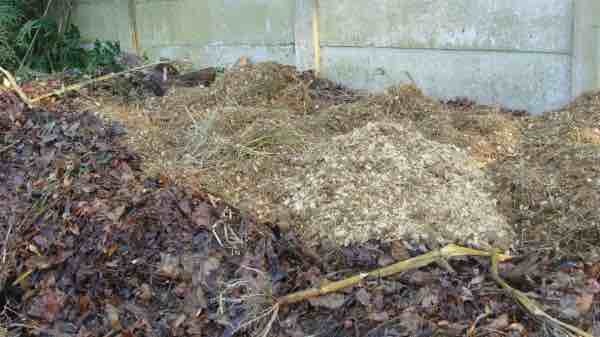
This page was last updated by Bernard Preston on 9th April, 2023.
For the first time in three million years the level of carbon in the atmosphere has risen above 400ppm. It is no coincidence that recently we experienced the highest temperatures ever; and floods on the Eastern seaboard of South Africa as never witnessed before.
And in 2021 the world again matched those high temperatures; the memory of the fires in Australia and California should be seared into our minds.
By getting your garden soil ready before planting you are reversing this process; and enabling the earth to again capture that excess carbon back from the atmosphere and storing it where it belongs below the surface of the ground.
It is known in technical terms as the "sequestration of carbon."
"The planet is witnessing the increased intensity of storms, droughts and melting glaciers; more frequent too. The rising sea levels and warming oceans also attest to it directly. Heatwaves and flooding have become commonplace. These are destroying economic infrastructure and habitats wreaking havoc on ecosystems, communities and livelihoods."
- Dr Pali Lehohla
A compost pile is not the most tidy item in the garden; if you are particularly house-proud and a perfectionist, it may take some getting used to.
There is such a thing as a compact compost-bin but it is so small and expensive that I find it hard to recommend and justify the cost.
In response to the comment about his working area, Einstein once remarked that if a cluttered desk is the sign of an untidy mind, what does a clear top symbolise?
If we want a habitable world for our grandchildren then each of us will have to begin contributing in our tiny, individual ways. Recycling makes a good start and from there collecting our vegetable waste from the kitchen; setting a compost pile is the next obvious step, untidy though it may be.
Only if you are completely besotted with backyard permaculture need you begin thinking about harvesting rainwater and sunshine; but growing organic fruit and vegetables is for everyone. It all starts with getting your garden soil ready. Strong research has now conclusively fingered the chemicals in ultra-processed foods as major causes of malignant tumours.
Getting your garden soil ready
Getting your garden soil ready is vital since it will then become a carbon sink and help to reduce global warming.
There are many benefits for you personally; a sense of purpose in a largely meaningless world, greater well-being and minimising medication. Add to that the possibility of reaching your eighties or nineties without the loss of your marbles and joints, for example. Could you turn your home and garden into a miniature blue zone?
Cyan is a combination of blue and green; those seeking to create this zone at their home are focusing on caring for both themselves and the planet.
Those who have not tasted freshly-picked food grown in compost will never know what they are missing out on. The flavour of lettuce straight from the garden to the salad plate, green peas and corn dropped without delay into boiling water are a daily joy for those who love their dinner and are prepared to spend the time in the vegetable patch; and firm new potatoes too.
Would you rather just go to McDonald's? Then I cannot help you, I am afraid.
"The other day I was raking leaves in my garden to make compost and it made me think, this is our work as humans at this time; to build good soil in our gardens, but also culturally and socially and to create potential for the future."
- Robin Wall Kimmerer
Starchy foods have come under the hammer of late as one of the primary causes of obesity yet we find that straight from the garden they have not affected our waistlines in the slightest.
I cannot help wondering if the glycemic index of freshly picked corn on the cob is not substantially lower than that from the greengrocer, eaten days after reaping; certainly the flavour is quite different.
A diabetic patient reports that new potatoes, straight from the ground before the haulm is poisoned, have no affect on his blood glucose; but ordinary spuds from cold storage must be followed by a squirt of insulin. This year I am going to test the effect of corn straight from the garden as compared with one a day old on my sugar readings.
The arums in the background make a lovely backdrop to the spuds. Whilst those from the cold rooms will certainly raise your blood sugar, freshly-harvested new potatoes don't do that.
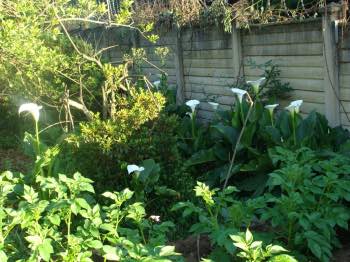
But I stray from the point; where do you start with getting your garden soil ready?
Find a corner of your land that is if possible midway between the kitchen, lawns and flower beds, on the one hand; and the vegetable garden on the other. Being able to easily empty the compost bin, barrow the grass and carry the prunings is important. Hiking this plant material long distances is a fag.
"This confirms that physical activity is paramount for cognitive function."
- Lancet Healthy Longevity
So too if you are going to add a few bags of horse
manure say, it is not going to break your back carting it from the
parking lot to the bottom of the yard. Personally I think I am lucky not to have a gardener. There is strong research confirming that it will help delay the loss of cognitive function.
Then there needs to be a mix of dry and green compostable materials; get them from wherever you can and start layering them down in an alternating manner. Do not compress the pile as it needs plenty of air.
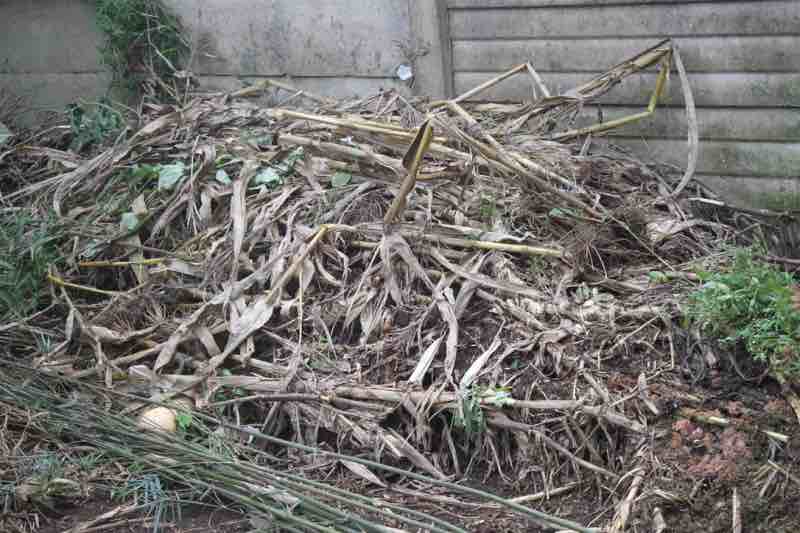
Dry corn stalks make an excellent base to the compost heap, for example. Grass cuttings will get the temperature up and adding a source of nitrogen like horse manure will greatly contribute to an ample supply of humus in a couple months' time.
Nothing works better than mulching your vegetables if you are thinking about getting your garden soil ready. Autumn is the season when we beg our neighbours to bring us their leaves, rather than send them to the dump. They can go on the compost pile too, obviously.
Keeping your own free-range chickens is another huge topic on its own; they provide the nitrogenous poop that your garden soil needs. They will also scratch for the larvae and snails that can decimate your vegetables. But hens do need to be managed correctly, or they will root out your tiny seedlings too.
Carbon is captured from the atmosphere in this plant material; returning it to the earth is the perfect way to reduce greenhouse emissions and getting your garden soil ready simultaneously.
In technical terms, scientists call it "soil organic carbon," or SOC.
The availability of water is a large factor in this soil carbon sequestration from the atmosphere. From our backyard permaculture standpoint, we advocate the harvesting of the rain and storing it either in fibreglass tanks or better still an underground reservoir that keeps it very cold and thus potable. Plastic, though cheaper, does not last and they are not easily fixable, if at all, when damaged. A fire will destroy them.
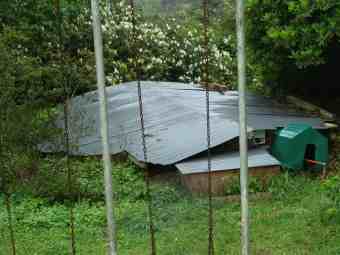
This is our 7,000 gallon reservoir; with a few supplemental above-ground tanks we have enough water for the whole year; not only does it help keep the compost heaps damp in dry periods, thus contributing to getting the garden soil ready for planting, but obviously for irrigation of the plants as they grow.
This is our rainwater harvesting model.
Fertile garden soil with plenty of compost and a covering of mulch also increases its holding capacity, requiring less irrigation, and increasing the potential harvest. What is your water innovation?
Scientists have shown that between 50 and 70 percent of the soil carbon stock is lost to the atmosphere once the ground is cleared of vegetation; and it takes 20 or more years to replenish the earth.
It is a slow process that every serious gardener and farmer is engaged in; carbon-capture. At the same time you are getting your soil ready for a bountiful harvest for the table.
This one square metre patch for example will provide ample lettuce, spring onions and parsley within a few weeks for our salads; notice the mulch.
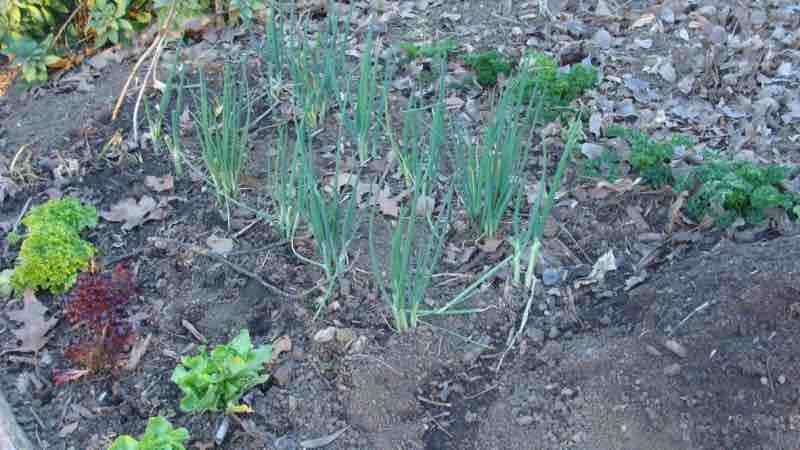
“The great concerns of our time, climate change, natural resources and food production, all boil down to the condition of the soil; water control, conservation, and human health too.”
- Isabella Tree
Getting your garden soil ready is one excellent way to prepare yourself for the certainty of water scarcity in the world in many parts; its capacity to retain moisture is greatly increased.
Interestingly and confusingly perhaps, large densities of animals such as cattle or pigs release nitrogenous gases into the atmosphere contributing to the greenhouse effect, but positively adding organic manures to our compost; and hence to the earth making it one of the most important ways of improving your soil organic carbon (SOC).
"Mother Earth evolved her sophisticated “carbon capture and sequestration” technology of photosynthesis which allows plants and microbes to capture the sunlight; and the CO2 in the atmosphere and transform it into oxygen, our breath."
- Dr. Vandana Shiva
Newsletter
Our newsletter is entitled "create a cyan zone" at your home, preserving both yourself and Mother Earth for future generations; and your family too, of course. We promise not to spam you with daily emails promoting various products. You may get an occasional nudge to buy one of my books.
Here are the back issues.
- Investing in long-term health
- Diseases from plastic exposure
- Intensive lifestyle management for obesity has limited value
- A world largely devoid of Parkinson's Disease
- The impact of friendly bacteria in the tum on the prevention of cancer
- There's a hole in the bucket
- Everyone is talking about weight loss drugs
- Pull the sweet tooth
- If you suffer from heartburn plant a susu
- Refined maize meal and stunting
- Should agriculture and industry get priority for water and electricity?
- Nature is calling
- Mill your own flour
- Bake your own sourdough bread
- Microplastics from our water
- Alternative types of water storage
- Wear your clothes out
- Comfort foods
- Create a bee-friendly environment
- Go to bed slightly hungry
- Keep bees
- Blue zone folk are religious
- Reduce plastic waste
- Family is important
- What can go in compost?
- Grow broad beans for longevity
- Harvest and store sunshine
- Blue zone exercise
- Harvest and store your rainwater
- Create a cyan zone at your home
Here are our hens scavenging in the compost heap for grubs and worms; and simultaneously adding their organic chicken litter that greatly improves the breakdown of the vegetable material.
Chickens in the garden are our delight; pets that give an ample return of free range eggs for the money and time invested in them.
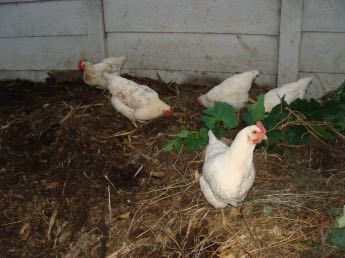
Other important ways of reducing the loss of carbon to the atmosphere, to repeat, are rotational use of the land, not tilling deeply and spreading generous amounts of compost over the soil. We try to follow a heavy-feeding crop like potatoes or corn with a legume like green beans or peas.
This all helps to restore our beautiful planet in some small way, and of course is a vital part of getting your garden soil ready to produce a bountiful harvest. Delicious food straight from the backyard is our way of ensuring the anti-oxidant substances into our bodies that help prevent arthritis and metastatic disease, for example.
They are anti-inflammatory too. It is our way of enjoying a "life without medication." Type it into Site Search in the main menu bar.
"Water is not the fundamental problem. It is poor soil. The absence of nutrients can be offset by cultivating plants that act in symbiosis with certain bacteria to produce their own fertilizer."
- Ernst van den Ende from Food Valley
That means planting and enjoying plenty of legumes that restore the nitrogen to the soil. Inoculating the seed with the right bacteria is not rocket-science, nor is it expensive; attention to detail is what makes for great food from the garden. Simultaneously it protects Mother Earth from the pernicious effect of greenhouse gases.
We call it a Cyan Zone issue; nurturing the well-being of both ourselves and the planet.
What are legumes may be a question you are asking.
Worm farms
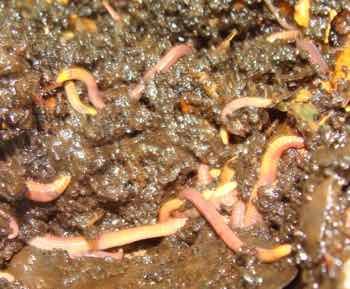
And lastly I cannot overemphasize the influence that the wonder of worm farms has had on our garden. Fruit trees are groaning under the weight of mulberries and lemons, and broad beans plants are growing to over five foot tall; we're having to think of new ways to support them, as never before.
Ocean acidification
Briefly on a separate but directly related topic, is ocean acidification. Those greenhouse gases lower the pH of our seas.
In the last 250 years, since the start of the industrial revolution, scientists have measured a 30 percent increase in the acidity of our oceans.
Whilst increased CO2 benefits sea algae, it has a very serious inhibitory effect on shellfish, corals and oysters for example; they are unable to make their exoskeletons. The death of the Great Barrier reef is just one example.
By getting your garden soil ready for planting you are in some small way making your contribution to stopping the ocean's pH from dropping even further.
Read more about this complex topic of ocean acidification[3].
When browsing use right click and "Open Link in New Tab" or you may get a bad gateway signal.
Did you find this page interesting? How about forwarding it to a friend, or book and food junkie? Better still, a social mead tick would help.
- Bernard Preston homepage
- Permaculture
- Getting Your Garden Soil Ready
Address:
56 Groenekloof Rd,
Hilton, KZN
South Africa
Website:
https://www.bernard-preston.com